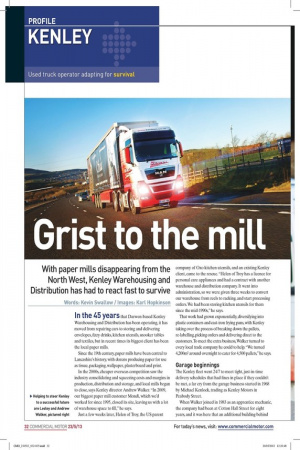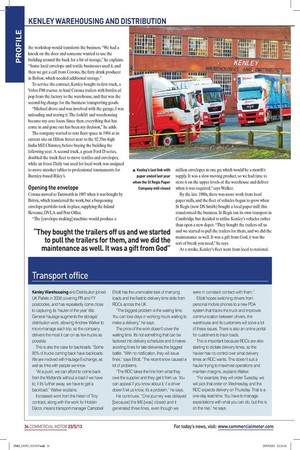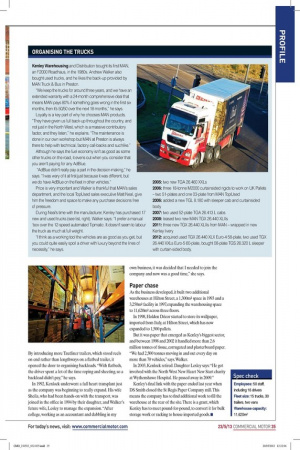With paper mills disappearing from the North West, Kenley Warehousing
Page 25

Page 27

Page 28

If you've noticed an error in this article please click here to report it so we can fix it.
and Distribution has had to react fast to survive Words: Kevin Swallow! Images: Karl Hopkinson In the 45 years that Darwen-based Kenley Warehousing and Distribution has been operating, it has moved from repairing cars to storing and delivering envelopes, fizzy drinks, kitchen utensils, snooker tables and textiles, but in recent times its biggest client has been the local paper mills Since the 19th century, paper mills have been central to Lancashire's history, with dozens producing paper for use as tissue, packaging, wallpaper, plasterboard and print.
In the 2000s, cheaper overseas competition saw the industry consolidating and squeezing costs and margins in production, distribution and storage, and local mills began to close, says Kenley director Andrew Walker. "In 2009, our biggest paper mill customer Mondi, which we'd worked for since 1995, closed its site, leaving us with a lot of warehouse space to fill," he says.
Just a few weeks later, Helen of Troy, the US parent company of Oxo kitchen utensils, and an existing Kenley client, came to the rescue. "Helen of Troy has a licence for personal care appliances and had a contract with another warehouse and distribution company. It went into administration, so we were given three weeks to convert our warehouse from reels to racking, and start processing orders. We had been storing kitchen utensils for them since the mid-1990s," he says.
That work had grown exponentially, diversifying into plastic containers and cast-iron frying pans, with Kenley taking over the process of breaking down the pallets, re-labelling, picking orders and delivering direct to the customers. To meet the extra business,Walker turned to every local trade company he could to help. "We turned 4,200m2 around overnight to cater for 4,500 pallets," he says.
Garage beginnings The Kenley fleet went 24/7 to meet tight, just-in-time delivery schedules that had fines in place if they couldn't be met, a far cry from the garage business started in 1968 by Michael Kenlock, trading as Kenley Motors in Peabody Street.
When Walker joined in 1983 as an apprentice mechanic, the company had been at Cotton Hall Street for eight years, and it was here that an additional building behind the workshop would transform the business. "We had a knock on the door and someone wanted to use the IIWWI building around the back for a bit of storage," he explains. "Some local envelope and textile businesses used it, and then we got a call from Corona, the fizzy drink producer in Bolton, which needed additional storage."
To service the contract, Kenley bought its first truck, a Volvo F88 tractor, to haul Corona trailers with bottles of pop from the factory to the warehouse, and that was the second big change for the business: transporting goods.
"Michael drove and was involved with the garage, I was unloading and storing it. The forklift and warehousing became my core focus. Since then, everything that has come in and gone out has been my decision," he adds.
The company started to rent floor space in 1984 at its current site on Hilton Street next to the 92.35m-high India Mill Chimney, before buying the building the following year. A second truck, a green Ford D series, doubled the truck fleet to move textiles and envelopes, while an Iveco Daily van used for local work was assigned to move snooker tables to professional tournaments for Burnley-based Riley's.
Opening the envelope Corona moved to Tamworth in 1987 when it was bought by Britvic, which transferred the work, but a burgeoning envelope portfolio took its place, supplying the Inland Revenue, DVLA and Post Office.
"The [envelope-making] machine would produce a million envelopes in one go, which would be a month's supply. It was a slow moving product, so we had time to store it on the upper levels of the warehouse and deliver when it was required," says Walker.
By the late 1980s, there was more work from local paper mills, and the fleet of vehicles began to grow when St Regis (now DS Smith) bought a local paper mill: this transformed the business. St Regis ran its own transport in Cambridge but decided to utilise Kenley's vehicles rather than open a new depot. "They bought the trailers off us and we started to pull the trailers for them, and we did the maintenance as well. It was a gift from God, it was the sort of break you need," he says.
At a stroke, Kenley's fleet went from local to national.
By introducing more Tautliner trailers, which stood reels on end rather than lengthways on a flatbed trailer, it opened the door to organising backloads. "With flatbeds, the driver spent a lot of the time roping and sheeting, so a backload didn't pay," he says.
In 1992, Kenlock underwent a full heart transplant just as the company was beginning to really expand. His wife Sheila, who had been hands-on with the transport, was joined in the office in 1994 by their daughter, and Walker's future wife, Lesley to manage the expansion. "After college, working as an accountant and dabbling in my own business, it was decided that I needed to join the company and now was a good time," she says.
Paper chase As the business developed, it built two additional warehouses at Hilton Street, a 1,300m2 space in 1993 and a 3,250m2 facility in 1997, expanding the warehousing space to 11,620m2 across three floors.
In 1998, Holden Decor started to store its wallpaper, imported from Italy, at Hilton Street, which has now expanded to 1,500 pallets.
But it was paper that emerged as Kenley's biggest sector, and between 1998 and 2002 it handled more than 2.6 million tonnes of tissue, corrugated and plasterboard paper. "We had 2,500 tonnes moving in and out every day on more than 70 vehicles," says. Walker.
In 2003, Kenlock retired. Daughter Lesley says: "He got involved with the North West New Heart New Start charity at Wythenshawe Hospital. He passed away in 2009."
Kenley's final link with the paper ended last year when DS Smith closed the St Regis Paper Company mill This means the company has to find additional work to fill the warehouse at the rear of the site. There is a grant, which Kenley has to meet pound-for-pound, to convert it for bulk storage work or racking to house imported goods. • ORGANISING THE TRUCKS Kenley Warehousing and Distribution bought its first MAN, an F2000 Roadhaus, in the 1980s. Andrew Walker also bought used trucks, and he likes the back-up provided by MAN Truck & Bus in Preston.
"We keep the trucks for around three years, and we have an extended warranty with a 24-month comprehensive deal that means MAN pays 80% if something goes wrong in the first six months, then it's 50/50 over the next 18 months," he says.
Loyalty is a key part of why he chooses MAN products. "They have given us full back-up throughout the country, and not just in the North West, which is a massive contributory factor, and they listen," he explains. "The maintenance is done in our own workshop but MAN at Preston is always there to help with technical, factory call-backs and suchlike."
Although he says the fuel economy isn't as good as some other trucks on the road, it evens out when you consider that you aren't paying for any AdBlue.
"AdBlue didn't really pay a part in the decision-making," he says. "I was wary of it at first just because it was different, but we do have AdBlue on the fleet in other vehicles."
Price is very important and Walker is thankful that MAN's sales department, and the local TopUsed sales executive Matt Neal, give him the freedom and space to make any purchase decisions free of pressure.
During Neal's time with the manufacturer, Kenley has purchased 17 new and used trucks (see list, right). Walker says: "I prefer a manual 'box over the 12-speed automated Tipmatic. It doesn't seem to labour the truck as much at full weight.
"I think as a working tool the vehicles are as good as you get, but you could quite easily spoil a driver with luxury beyond the lines of necessity," he says. 2005: two new TGA 26.460 XXLs 2006: three 18-tonne M2000 curtainsided rigids to work on UK Pallets — two 51-plates and one 03-plate from MAN TopUsed 2006: added a new TGL 8.180 with sleeper cab and curtainsided body 2007: two used 52-plate TGA 26.413 L cabs 2008: leased two new MAN TGX 26.440 XLXs 2011: three new TGX 26.440 XL_Xs from MAN — wrapped in new Kenley livery 2012: acquired used TGX 26.440 XLX Euro-4 58-plate, two used TGX 26.440 XXLs Euro-5 60-plate, bought 08-plate TGS 26.320 L sleeper with curtain-sided body.









































